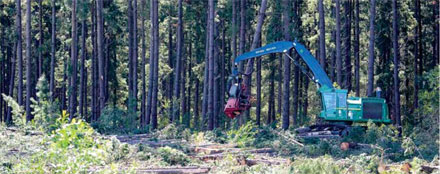
Timber processors in South Australia are unable to employ more workers due to low levels of supply of raw material from SA’s own forests, a problem caused by absurd export practices, says a small but powerful forestry industry group in Mt Gambier. Source: Timberbiz
Chief Executive of SATPA (SA Timber Processors Association) David Quill, speaking from Mount Gambier, said his members were totally supportive of recent calls by Federal and State MPs for better management of export contracts to limit the numbers of quality logs going to Chinese processors.
Local State MP Troy Bell has said local processors had told him they could expand and grow, if controls were placed on the export of some logs.
“Unfortunately for our community, these companies are facing great difficulty in accessing any additional wood fibre. We need to prioritise log supply to create local job opportunities. Currently there is not a level playing field for local businesses competing for log supply with the export market. There are hundreds of jobs that could be created in the South East if exports of raw log were reduced,” he said.
Federal Member for Barker Tony Pasin MP also warned in parliament that SE regional timber processors are stymied for growth because of the ongoing direct export of raw logs to overseas processors.
He said prospects for growth in the processing industry in forestry regions are currently limited by the lack of access to domestic log supply – “not because we do not have access to that resource, but because we are exporting that resource in the form of raw logs directly to overseas processors”.
“We stand by these positive comments from our elected representatives,” said David Quill. “Our members are getting tired of voicing their concerns to all levels of Government about the need for a serious audited review of cost, volume and term of supply agreements from forest growers. We are pleased that Troy and Tony are listening to our concerns.
“We may be a small group of small businesses, but the big businesses also fear for their long-term wood supplies.
“The exporting of plantation grown softwood logs should be confined to those products that cannot be utilised by our highly efficient domestic processing industry. We are exporting jobs with the current policies of major forestry growers. This is no different from the farce of gas producers selling cheaply to overseas dealers while we must import gas for domestic uses – it is ridiculous and makes no sense to sell our natural resources from under local jobs.
“SATPA is in favour of the export of fibre but only where it is not at the expense of the domestic market. Product that can be used by domestic processors continues to be exported, namely potential preservation material and sawlogs that our members turn into useful products for other local industries. A good example is the national shortage of posts required by the viticultural industry for maintenance and rejuvenating vineyards,” Mr Quill said.
Figures obtained by SATPA show that Australia continues to increase imports of timber products while exporting record volumes of softwood logs. SATPA claims plantations can be managed to ensure resource for domestic processors into the future. Last year in the Green Triangle more than 1.7 million cubic tonnes was exported, equating to close to 50% of national exports.
“Australian domestic manufacturers need reasonable terms of contract in any supply agreement and a level playing field. At the moment, we are operating at significant disadvantage because the Chinese Government is assisting their processors with subsidies, and they also operate at almost no level of safety and environmental compliance, which is a huge saving to them and potentially a human rights offence,” Mr Quill said.
SATPA member companies are all family owned enterprises, which:
· Directly employ local South Australians in and around Mt Gambier;
· Indirectly employ contractors in the transport, engineering, maintenance and consulting sectors in and around Mt Gambier;
· Have invested significant amounts in capital investments over the last 5 years to support local jobs;
· Sell a wide range of finished goods into the Australian construction, packaging and vineyard industries; and
· SATPA member production plants provide processed wood outputs into the Australian market include but are not limited to structural/framing and case grade timber, fence palings, pallet components, stress graded timber, untreated and treated roundwood material. The latter includes both CCA and creosote and covers a range of products from poles to posts, rails and bollards.
These products primarily supply Adelaide and Melbourne markets but also Regional areas in SA and Vic, with some products into NSW.





